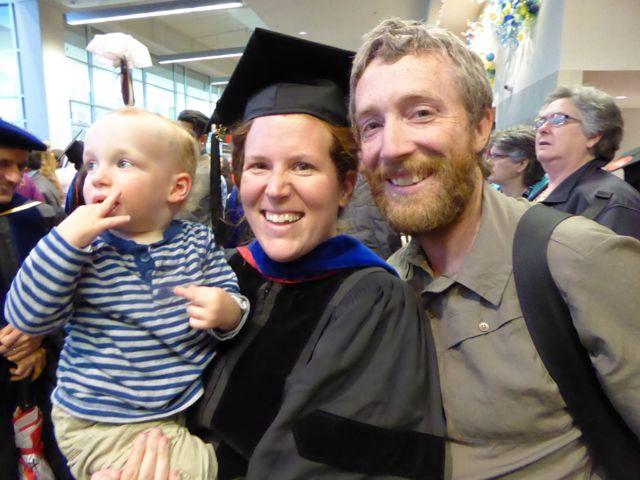This week’s tale is another data point about being pregnant in the field as a graduate student, complete with some excellent advice for mentors and mentees! I’m excited we have two featured on the blog so far, and can’t wait for the time when we will have enough to compile a book or something. Until, then, though…enjoy 🙂
Another tale of (re)productive fieldwork
Kirstie Savage previously wrote for Field Secrets about her (re)productive Masters fieldwork . I wanted to share another tale of (re)productive fieldwork, from my PhD graduate school experience, including some considerations for both mentors and mentees when planning for their own fieldwork (or supervising others). Kirstie and I have very different experiences, and our two data points are just that – just two. Understanding the diversity of experiences and paths to success in fieldwork for pregnant and nursing people in the field can help everyone better plan.
When I started graduate school, I didn’t plan on or imagine being pregnant during fieldwork. But several years in, I was married and expecting my first kid. The math showed that Kid#1 would be born after my third and final field season of graduate school – but due dates are notoriously inaccurate and anything could happen. “Fieldwork” can and does mean a lot of different activities and disciplines – in my case, I was doing insect community ecology and population biology in farm fields across hundreds of miles. My fieldwork involved a lot of driving.
Communication is key
It can potentially be uncomfortable to talk about one’s reproductive health and body with advisors, committee members, or collaborators. But as Dr. Kimberly Riskas wrote previously on this site, your safety is more important than any data. Communication is key not because anyone is entitled for information about your body and your family but because this information – when you’re ready to share – will help ensure that you are safe in the field.
Know your rights
Ideally, everyone in your research team will support you as a researcher and pregnant person. Even if they are supportive, they may not have worked with a pregnant person in the field before – or may have worked with someone with very different preferences than you. As Rose Eveleth recently reported, pregnant laboratory workers often don’t get any safety guidance. The same is generally true of pregnant fieldworkers and their supervisors. On one hand, you may want people not to assume you cannot do physically demanding labor. On the other, you may want people to know that you have needs that will change day to day and are entitled to flexibility based on your pregnancy status and health.
Check out resources like The Pregnant Scholar to read up on resources and legal guidance specific to your career stage. Knowledge is power!
Have a backup plan
What’s your Plan B (and C and D) if you have a day where you physically can’t do your usual research? This isn’t just the responsibility of the pregnant individual. This is the responsibility of the whole team. Remember that safety comes first!
Can your team afford an additional technician to help you or take over? Can your lab organize a sign up schedule of colleagues who could pitch in if needed? The most important thing is to openly discuss and plan for the possibilities.
One note from my own experiences – consider making a cell phone ‘calling tree.’ What if you get injured in the field? What if you get too tired on your commute in to meet your research crew?
Kaitlin Stack Whitney walks through a soybean field counting soybean aphids on her transect, after changing the yellow sticky card attached to the flagged pole in the field. Notice there is no shade in soybean fields, making (re)productive fieldwork especially grueling throughout the four month growing season fieldwork period.
Find a friend
Having colleagues in other departments who were also pregnant or had recently been was immensely helpful. We discussed strategies on talking with advisors and funders. We also teamed up when our building manager wouldn’t allow us pumping space (he didn’t understand the legal rights of nursing parents) and successfully negotiated access to building space that benefitted all the nursing parents in the building.
Celebrate and center your health
When it came down to it, I was fortunate that my pregnancy was relatively complication free and that I was able to participate in my entire field season. I physically participated in fieldwork through 38 weeks of pregnancy, and Kid#1 was induced at 42 weeks and born via emergency C-section (a story for another time!). I am ever grateful to a supportive graduate advisor, research team, student collaborators, and family to help make my experiences as a (re)productive graduate student successful. Now as a new faculty member and research advisor, I strive to prioritize the health and safety of pregnant scholars that I supervise.
Kaitlin Stack Whitney graduating with her PhD along with then-Kid#1 in arms – and 22 weeks pregnant with Kid#2.
Have insight you’d like to share? Join us on Twitter (#FemFieldSecrets and @FemFieldSecrets) to continue the conversation!
Interested in telling your whole tale? We would love to hear from you!

